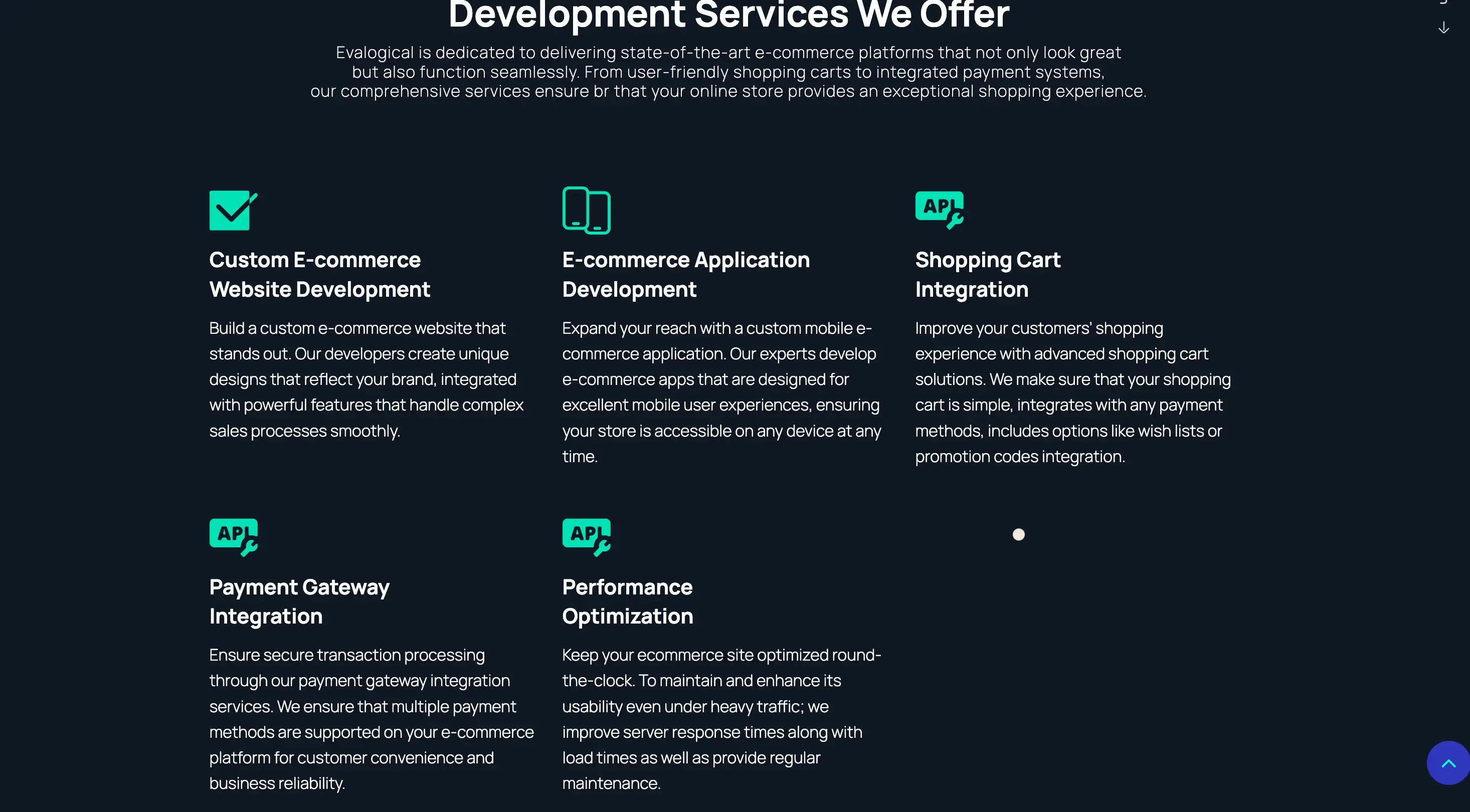Upcoming trends in mobile app development
Published by: Admin EvalogicalNov 16, 2023Blog
Current and Forthcoming Mobile App Development Trends for 2023
The technological field is something that is evolving all the time. And as mobile phones and mobile apps are close pals of technology and humans, evolution will come to them occasionally. From being just a thing to connect people, mobiles and their apps are now a device we use extensively.
Mobile's intrusion into our daily lives is made much more possible by the rapid development of mobile apps. When it comes to industries like this, staying updated with the latest trends is crucial for achieving success.
This article lets you know the exciting and transformative trends that are shaping the future of mobile app development to make sure your app stays relevant, user-friendly and capable of meeting the ever-growing demands of the modern customer.
Top 11 Trends in Mobile App Development

The Rise of 5G Technology
5G technology, just like the buzz we are having, is a big deal in mobile app development. The 5G network brings you super-fast speeds, low latency, and the ability to handle many connected devices at a time. According to a Statista analysis, there will be 1.9 billion anticipated 5G subscriptions globally by 2023. It is expected to reach 2,8 and 5,9 billion by 2024 and 2027, respectively. This network is capable of improving the app's function by using new technologies, including augmented and virtual reality, quick data transfer, and increased live streaming. The emergence of 5G technology will improve the overall functioning of mobile devices, which will help developers add new features to mobile applications.
Internet of Things (IoT) App Integration
The Internet of Things is a field that is rapidly expanding. It connects our everyday devices and sensors to the internet. This has become a need in our daily lives as we get to handle multiple devices, all of which are connected to the internet. The increasing use of mobile devices in various sectors and areas has opened up the wide possibilities of the IoT. Mobile app developers are incorporating IoT into their apps, which makes it easy to control and monitor IoT devices using your smartphone.
Artificial Intelligence (AI) and Machine Learning (ML)
To make the mobile app's performance more promising, artificial intelligence and machine language were integrated into it. These technologies enhance the user experience through personalised recommendations, intelligent automation, and predictive analytics. The chatbots powered by AI are becoming more sophisticated than earlier and offer better customer support and engagement among various apps. In the case of Machine Learning, the ML algorithms are used for image recognition, natural language processing, and data analysis, making apps more efficient and user-centric.
Augmented Reality (AR) and Virtual Reality (VR)
Augmented reality incorporates virtual aspects into the physical world. It enhances the overall user experience by enabling applications such as virtual try-ons for online shopping and interactive gaming experiences. When it comes to Virtual Reality (VR), gives users immersive experiences in virtual environments, offering virtual tours, virtual training, and immersive entertainment experiences. The tech champions--Apple, Google, and Meta--are making significant marks in AR and VR. In the coming years, AR and VR will definitely shape and reshape the mobile app development industry in a way that surpasses the imagination.
Customised Apps for Foldable Devices
Samsung and Motorola have released their foldable smartphones, pushing the boundaries of technology. These foldable devices offer multiple sets of opportunities as well as challenges to the developers. The dynamic layouts on these devices will adjust the UI to fit their current size, which makes them either tablets or phones. These devices offer a larger screen size than traditional smartphones. The performance of foldable smartphones is powerful, and the developers need to optimise their apps for smooth performance on them. This trend of customising apps in a way suitable for foldable devices has the potential to shape the future of mobile development.
Extended Reality (XR)
Extended reality (XR), a combination of augmented reality (AR) and virtual reality (VR), is gaining popularity in mobile apps. The XR is working on creating immersive and interactive experiences that blur the line between the physical and digital worlds. The major enterprises have accepted and recognised the so-called potential of XR for virtual training and onboarding procedures. XR has the capacity to transform how we work, play, and connect, and it can also deliver extraordinary experiences to users by opening up endless options for businesses and developers alike.
Wearable App Integration
Smartwatches, fitness bands, and trackers are creating a great impact, and they are becoming more common. According to the reports from Statista, the total number of linked wearables has risen to 1.1 billion from 929 million the previous year. Apple made a significant announcement regarding wearables and app integration at WWDC in 2019. App developers as well as businesses have the task of creating apps that provide an outstanding digital experience for all users on all types of wearable devices. The capability of the wearables is quite amazing and worth every penny you spend on them. They can help you navigate to your destination and can even let you call without having the phone around.
Touchless UI
Touchless UI is another amazing and emerging trend in mobile app development. Many users are already familiar with the touchless UI, such as signing in, identifying themselves through biometrics, and so on. The upcoming mobile apps can also track eye movements to help with tasks like scrolling and other functions. This trend not only enhances the user experience but also aligns with evolving expectations for a more accessible digital experience.
Mobile App Security
Like all other types of technologies, mobile devices also face security challenges. As people depend more on mobile apps, app developers should focus more on cybersecurity and seek to develop apps with data protection and information privacy laws. The apps should go through thorough testing during the stage of app development, and it is essential to identify and fix all issues as the trust of the customer is at stake. Incorporating biometrics such as fingerprints or facial scans will add an extra layer of security. It is important to prioritise app security to inculcate trust and ensure long-term success.
Blockchain Technology
Blockchain technology is a dominant trend in mobile app development and it is revolutionising various industries. It enables transparent and tamper-proof transactions and data storage. Blockchain technology is incorporated into mobile apps for a number of reasons, including streamlining business operations, enhancing security, and giving users confidence and transparency. They can be used in areas like healthcare, finance, supply chain management, voting games, and so on. This is a technology which is paving the way for a more secure and decentralised digital future.
Cross Platform Development
React, Native, Flutter, and Xamarin are some of the cross-platform development frameworks that are gaining popularity among developers. These frameworks have the advantage of allowing developers to write the code once and use it on multiple platforms, thereby reducing development time and costs. Cross-platform development will remain popular as more companies want to reach a larger audience, ensuring that apps are accessible on both iOS and Android devices.
What Makes Evalogical the Best Mobile Development Service?
The mobile phone and mobile app industry is something that is continuously evolving, and each year everyone can expect something more exciting to come. The developers as well as those who are in this business should be very keen on the latest trends and stay updated on everything. It can help you build your business better and stay ahead of every sort of competition.
Evalogical is a collective team where you can build stunning websites, mobile apps, ERP solutions, and IT products. We work with the intention of bringing the best to the table for each of our esteemed clients. We align every technological choice with international standards of quality and technology.
FAQs
- How does 5G fit into the current trends in mobile app development?
Faster speeds, less latency, and more network capacity are some of the ways that 5G technology is poised to transform mobile app development. This paves the way for the creation of immersive experiences, enhanced real-time communication, and more solid support for high-quality video and AR/VR applications.
- What are the benefits of AI and ML for mobile apps?
Mobile apps can benefit from personalised recommendations, intelligent automation, and predictive analytics provided by AI and ML. AI-powered chatbots offer better customer service, while machine learning (ML) makes activities like image recognition and natural language processing possible.
- How does the Internet of Things (IoT) relate to mobile applications?
The Internet of Things is a network of linked gadgets and sensors. Through interactions with IoT devices, mobile apps let users control wearables, smart home appliances, and more. This connectivity also lets companies get information from IoT devices and look it over.
- Should mobile app developers take into account cross-platform development frameworks?
Yes, frameworks for cross-platform programming like Flutter and React Native are becoming more and more popular. Developers can write code once and use it on many systems, which cuts down on development time and costs and lets them reach more people.



 test2....
test2....
 test1....
test1....
 test staging....
test staging....
 test....
test....
 The ROI of Change: How Digital....
The ROI of Change: How Digital....

Your Trusted Software Development Company